 October 2009
Pure Pleasure from Pure Pleasure
Records
There is any number of vinyl reissue labels
these days. Many are in it just for the bucks; far fewer are those that really care about
the product they deliver to the buyer. Pure Pleasure Records Limited seems to be one of the latter.
From remastering to pressing plant -- in their case, the
Pallas plant in Germany -- Pure Pleasure seems to take every step of the reissue process
seriously. And unlike some of their competition, they don’t stick to one or two
musical genres or labels, but look everywhere for albums they feel their buyers will
enjoy. I’ve listened to some of the latest offerings from Pure Pleasure, and they run
the gamut from blues to R&B to rock to jazz, with one of the jazz titles veering over
the line into the classical field.
 The LPs offered range from blues legend
Mississippi Fred McDowell’s I Do Not Play No Rock’n’Roll (PPAN
ST409) to British blues/pop/jazz/R&B star Georgie Fame’s Cool Cat Blues
(PPAN009) to the Jefferson Airplane’s Bless Its Pointed Little Head (LSP-4133)
to Boz Scaggs’ Silk Degrees (PC 33920), and finally to such jazz LPs as
Stanley Turrentine’s Sugar (CTI 6005) and Duke Ellington’s jazz version
of Tchaikovsky’s The Nutcracker Suite (CS 8341). They offer almost everyone
something to get excited about. (Average price is around £25 each, plus shipping.) The LPs offered range from blues legend
Mississippi Fred McDowell’s I Do Not Play No Rock’n’Roll (PPAN
ST409) to British blues/pop/jazz/R&B star Georgie Fame’s Cool Cat Blues
(PPAN009) to the Jefferson Airplane’s Bless Its Pointed Little Head (LSP-4133)
to Boz Scaggs’ Silk Degrees (PC 33920), and finally to such jazz LPs as
Stanley Turrentine’s Sugar (CTI 6005) and Duke Ellington’s jazz version
of Tchaikovsky’s The Nutcracker Suite (CS 8341). They offer almost everyone
something to get excited about. (Average price is around £25 each, plus shipping.)
I Do Not Play No Rock’n’Roll, recorded in
1969 for Capitol Records, is the very essence of what electric blues is all about, and
Mississippi Fred McDowell is superb. This is the first album on which he played electric
guitar -- up till then he’d been strictly acoustic -- and he plays it as if born to
the instrument. It doesn’t obscure his authenticity, only heightens it. In fact, his
slide playing is clearer and crisper on electric than on acoustic. He’s backed by an
unnamed band who only help to engage and draw the listener further into the blues. This is
pure, honest Southern blues played by a man intimately familiar with what he’s
singing about. Each side begins with a great introduction in which McDowell explains his
style and his music. It’s great, great music, and a true blues classic.
The sound is very good. McDowell offers a raw, unfettered
sound that just smacks of the real. I can almost feel myself transported to the
cotton fields of Dixie, sweating under the hot sun. McDowell’s voice has that raw,
whiskey-and-leather quality that, to me, is the essence of a true bluesman’s voice.
His electric guitar sears out of the left speaker, but that reveals the only fly in this
ointment. McDowell’s voice, wonderfully captured, is mixed dead center, but his
guitar comes out of the left speaker. It’s a bit odd at first listen, but I soon got
used to it. And it does nothing to diminish the overall sense of realness this album
portrays. The band, while noticeable, is not recorded as well, unfortunately.
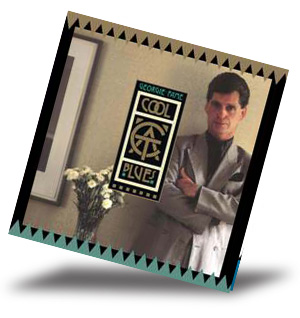 The Georgie Fame album,
originally released on Go Jazz, is pure, unadulterated R&B that can stand with
anything released by such artists as Ray Charles and Van Morrison. Fame’s long and
varied career has carried him through the blues, to pop fame, to jazz, and on through
R&B -- which is the genre of Cool Cat Blues. His only problem is that most of
Fame’s fame has been in England and Europe -- his US popularity is sadly lacking.
Hopefully, this reissue will go some way toward correcting that. Joined here by such
stalwarts as drummer Steve Gadd, guitarists Robben Ford and Hugh McCracken, saxophonist
Lawrence Feldman, percussionist Ralph MacDonald, and vocalists Boz Scaggs and Jon
Hendricks, Fame runs though a playlist of originals, standards, and contemporary songs,
such as the title track (Fame’s ode to Mose Allison), Hoagy Carmichael’s
"Georgia," and Van Morrison’s "Moondance" (on which he’s
joined by Morrison himself). Never having heard of Fame before this album, I was mightily
impressed. His vocal prowess carries the day as he glides, rough and ready, though the
song list. If you have even the slightest liking for R&B, you need to buy this album
and find out what you’ve been missing. The Georgie Fame album,
originally released on Go Jazz, is pure, unadulterated R&B that can stand with
anything released by such artists as Ray Charles and Van Morrison. Fame’s long and
varied career has carried him through the blues, to pop fame, to jazz, and on through
R&B -- which is the genre of Cool Cat Blues. His only problem is that most of
Fame’s fame has been in England and Europe -- his US popularity is sadly lacking.
Hopefully, this reissue will go some way toward correcting that. Joined here by such
stalwarts as drummer Steve Gadd, guitarists Robben Ford and Hugh McCracken, saxophonist
Lawrence Feldman, percussionist Ralph MacDonald, and vocalists Boz Scaggs and Jon
Hendricks, Fame runs though a playlist of originals, standards, and contemporary songs,
such as the title track (Fame’s ode to Mose Allison), Hoagy Carmichael’s
"Georgia," and Van Morrison’s "Moondance" (on which he’s
joined by Morrison himself). Never having heard of Fame before this album, I was mightily
impressed. His vocal prowess carries the day as he glides, rough and ready, though the
song list. If you have even the slightest liking for R&B, you need to buy this album
and find out what you’ve been missing.
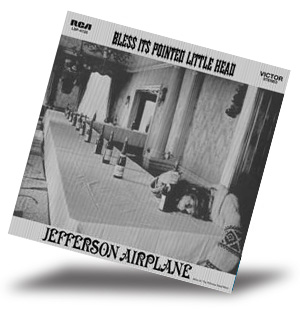 Of all the LPs reviewed here, Cool
Cat Blues is probably the best sounding. Recorded in 1990 in New York by James Farber,
it has highly detailed sound, with voices that sound three-dimensional and live. The
instruments, especially the piano and organ, also stand out as realistic. Fame sang all
these songs live in the studio, and every track is a first or second take -- something
rarely done these days. Put this on your turntable, sit back, and enjoy some of the
best-sounding R&B to come down the pike in a long, long time. Of all the LPs reviewed here, Cool
Cat Blues is probably the best sounding. Recorded in 1990 in New York by James Farber,
it has highly detailed sound, with voices that sound three-dimensional and live. The
instruments, especially the piano and organ, also stand out as realistic. Fame sang all
these songs live in the studio, and every track is a first or second take -- something
rarely done these days. Put this on your turntable, sit back, and enjoy some of the
best-sounding R&B to come down the pike in a long, long time.
Production values were never the highest priority for
big-selling rock records, and the next two LPs are no exceptions. Jefferson
Airplane’s Bless Its Pointed Little Head was taped live for RCA in 1968 at the
Fillmores West and East. It captures the band in its natural habitat -- the concert stage.
The West Coast concert is a bit more raucous and slightly better recorded, but both sides
of this LP show the Airplane at a perfection of playing -- if not in the highest fidelity.
Boz Scaggs’ Silk Degrees, released by Columbia Records in 1976, is a slick,
smooth studio production that polishes off the rough edges that, by comparison, make the
Airplane album sound so real. Silk Degrees was Scaggs’ best-selling album
(though not his best, in my opinion). His voice can sound convincing in any setting, and
here he digs into soul/rock with the authority of a man who has sung this way his entire
life. Backed by a Who’s Who of L.A. session musicians -- Little Feat guitarist
Fred Tackett, David Paich, Jeff Porcaro, Tom Scott, Jim Horn, Plas Johnson, and Chuck
Findley, among others -- Scaggs runs though what became some of his biggest hits, such as
"Lido Shuffle," "Lowdown," "What Can I Say," and
"It’s Over." Each sounds as fresh as the day it was recorded, which means
that this reissue sounds as good as any mint original -- and finding a mint original is
harder than you might think. While there are plenty of copies out there, Silk Degrees
was popular enough to be overplayed on the crappy record players of the day. This new
edition is a welcome addition to any rock library.
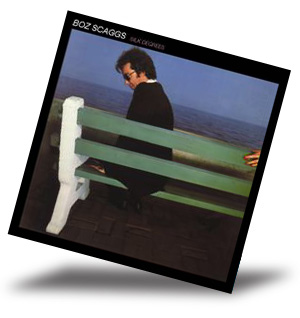 The nearly original Jefferson
Airplane comprised Grace Slick on keyboard and vocals (she took over from original lead
singer Signe Toly Anderson following the release of the band’s first album, Takes
Off), Jack Casady on bass, Spencer Dryden on drums, and Marty Balin, Paul Kantner, and
Jorma Kaukonen on guitars and vocals. Bless Its Pointed Little Head gives the band
a chance to stretch out in longer versions of some of their bigger studio tunes, such as
"Fat Angel" (7:29), "Rock Me Baby" (7:40), and "Bear Melt"
(11:06). You can almost feel the band coming alive as each member gets his or her chance
to shine. This version of "Somebody to Love" is alone worth the price of
admission. Finding a clean copy of this LP is even harder than finding a clean one of the
Boz Scaggs. Bless Its Pointed Little Head was not only played to death, but used by
the hippies of the day to do almost everything from eating on to rolling a joint before
listening, so most copies are pretty beat. Pure Pleasure’s remastering is so deathly
quiet by comparison that you’d almost think it was recorded and pressed but yesterday
-- until you listen to the sound. The nearly original Jefferson
Airplane comprised Grace Slick on keyboard and vocals (she took over from original lead
singer Signe Toly Anderson following the release of the band’s first album, Takes
Off), Jack Casady on bass, Spencer Dryden on drums, and Marty Balin, Paul Kantner, and
Jorma Kaukonen on guitars and vocals. Bless Its Pointed Little Head gives the band
a chance to stretch out in longer versions of some of their bigger studio tunes, such as
"Fat Angel" (7:29), "Rock Me Baby" (7:40), and "Bear Melt"
(11:06). You can almost feel the band coming alive as each member gets his or her chance
to shine. This version of "Somebody to Love" is alone worth the price of
admission. Finding a clean copy of this LP is even harder than finding a clean one of the
Boz Scaggs. Bless Its Pointed Little Head was not only played to death, but used by
the hippies of the day to do almost everything from eating on to rolling a joint before
listening, so most copies are pretty beat. Pure Pleasure’s remastering is so deathly
quiet by comparison that you’d almost think it was recorded and pressed but yesterday
-- until you listen to the sound.
The two albums are polar opposites in recording quality.
The Airplane LP sounds as if a few mikes were set up and the band just played. The vocals
are OK, but the instruments sound a bit muddy. The Scaggs LP is so slickly done that each
instrument is clearly reproduced. But Silk Degrees is most definitely a studio
recording; the air and space that suffuse the Airplane LP are conspicuously missing from
the Scaggs, which sounds as if it could have been recorded in various studios and patched
together by the mastering engineer. (It wasn’t; it was recorded entirely at Davlen
Sound in L.A.) So while Silk Degrees is the more audiophile-sounding LP, Bless
Its Pointed Little Head will have you feeling you were there at the concert. Which you
prefer will be up to you; I’m glad to have both.
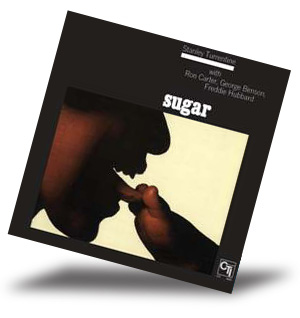 The two jazz offerings, too, are from
different eras. Stanley Turrentine’s Sugar was recorded by the redoubtable
Rudy Van Gelder and originally released on Creed Taylor’s CTI label in 1970. Duke
Ellington’s The Nutcracker Suite is a Columbia Records release from 1960 and
doesn’t list who recorded it, or where. Both are excellent examples of what one
version of the jazz of the day sounded like. By 1970 Van Gelder had his style down, and Sugar
sounds it. Turrentine on tenor sax is joined by his working bandmates Billy Kaye on
drums and Butch Cornell on organ, along with George Benson on guitar, Freddie Hubbard on
trumpet, Ron Carter on bass, Richard "Pablo" Landrum on congas, and newcomer
Lonnie L. Smith Jr. on electric piano. Van Gelder captures each cleanly and clearly. With
only four compositions, there’s plenty of space for the musicians to stretch out and
play, and Turrentine allows them that luxury. His big-toned tenor sound, steeped in swing,
is the focal point coming out of your left speaker, while Hubbard’s trumpet is all
breath and brass from the right. Benson’s guitar sings. But it’s Carter’s
bass that anchors the music. His long, fluid, comfortable sound is so clearly rendered
that I couldn’t help following his bass line though each number. Listen to the title
track for all you need to know about how good this album is. The two jazz offerings, too, are from
different eras. Stanley Turrentine’s Sugar was recorded by the redoubtable
Rudy Van Gelder and originally released on Creed Taylor’s CTI label in 1970. Duke
Ellington’s The Nutcracker Suite is a Columbia Records release from 1960 and
doesn’t list who recorded it, or where. Both are excellent examples of what one
version of the jazz of the day sounded like. By 1970 Van Gelder had his style down, and Sugar
sounds it. Turrentine on tenor sax is joined by his working bandmates Billy Kaye on
drums and Butch Cornell on organ, along with George Benson on guitar, Freddie Hubbard on
trumpet, Ron Carter on bass, Richard "Pablo" Landrum on congas, and newcomer
Lonnie L. Smith Jr. on electric piano. Van Gelder captures each cleanly and clearly. With
only four compositions, there’s plenty of space for the musicians to stretch out and
play, and Turrentine allows them that luxury. His big-toned tenor sound, steeped in swing,
is the focal point coming out of your left speaker, while Hubbard’s trumpet is all
breath and brass from the right. Benson’s guitar sings. But it’s Carter’s
bass that anchors the music. His long, fluid, comfortable sound is so clearly rendered
that I couldn’t help following his bass line though each number. Listen to the title
track for all you need to know about how good this album is.
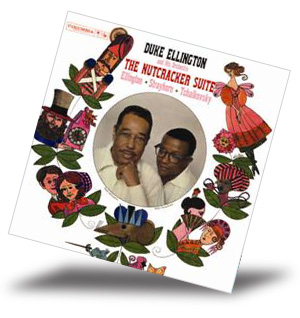 By contrast, Ellington’s Nutcracker
Suite is a product of its time: saxes to the left, horns to the right, piano and drums
center, each instrument reproduced cleanly if not in the best fidelity. Ellington, with
partner Billy Strayhorn, reworked and retitled seven of the nine numbers of
Tchaikovsky’s classic suite, giving jazz stalwarts like Johnny Hodges, Harry Carney,
Paul Gonzalves, Ray Nance, Juan Tizol, Britt Woodman, Sam Woodyard, and the rest their
chances to shine. In the most famous movement, "The Dance of the Sugar Plum
Fairy" (here renamed "Sugar Rum Cherry"), Carney and Gonzalves play the
melody on baritone saxes before the horn section steps in to step up the tempo, after
which they return the lead to the baritones. It’s a hoot, and a rollicking good time. By contrast, Ellington’s Nutcracker
Suite is a product of its time: saxes to the left, horns to the right, piano and drums
center, each instrument reproduced cleanly if not in the best fidelity. Ellington, with
partner Billy Strayhorn, reworked and retitled seven of the nine numbers of
Tchaikovsky’s classic suite, giving jazz stalwarts like Johnny Hodges, Harry Carney,
Paul Gonzalves, Ray Nance, Juan Tizol, Britt Woodman, Sam Woodyard, and the rest their
chances to shine. In the most famous movement, "The Dance of the Sugar Plum
Fairy" (here renamed "Sugar Rum Cherry"), Carney and Gonzalves play the
melody on baritone saxes before the horn section steps in to step up the tempo, after
which they return the lead to the baritones. It’s a hoot, and a rollicking good time.
Both albums will appeal to jazz lovers, but the ten-year
difference in recording dates is clearly evident: There is a sonic gulf between the sound
of Sugar and The Nutcracker Suite. Stereo had been around for only a few
years when Ellington laid down his album, and it shows in that strong separation of
instruments. Sugar, on the other hand, has no such limitations. By 1970, Van
Gelder, who had always been noted for his sharp left/right stereo mixes, now understood
how to create a believable soundstage. Sugar offers that in spades. It’s far
more believable than the Ellington album’s soundstage, and I found it easier to
suspend my disbelief. Still, it’s the Ellington album that will probably do a better
job of grabbing and keeping your attention. I think it’s because we all know this
magical classical piece of music, and because Ellington and Strayhorn have done such a
marvelous job of converting it to the jazz idiom.
If you’re looking for a reissue label to get behind
that offers a little bit of everything from a little bit of everywhere for just about
everyone, I can’t recommend Pure Pleasure Records highly enough. Every LP of theirs
that I have shines with a commitment to quality that’s sadly lacking from many of the
reissue labels of today. Pricey? Maybe, though not in the context of what most quality
reissues sell for these days. And if you like the music, then rest assured that it’ll
sound as good as -- or better than -- the original.
. . . John Crossett
johnc@soundstage.com
|

